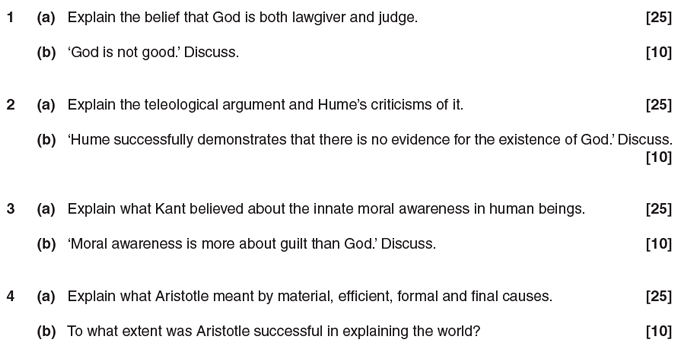
AS

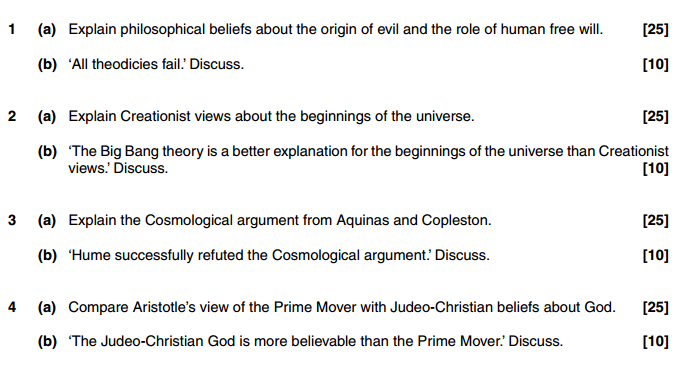
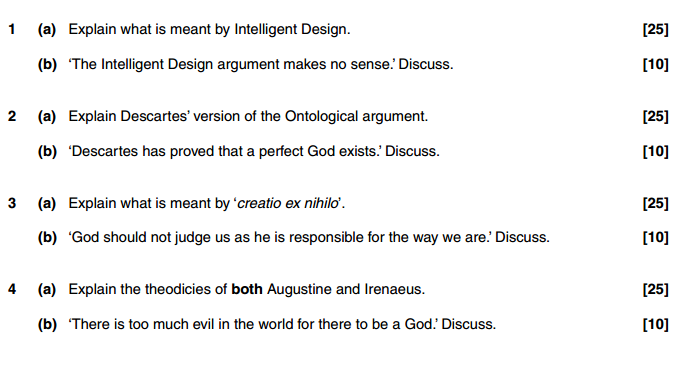
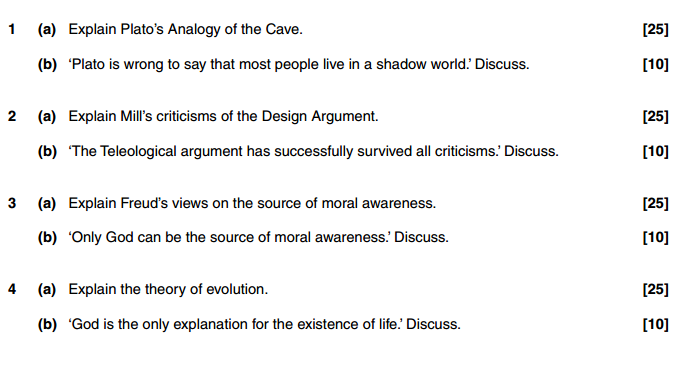
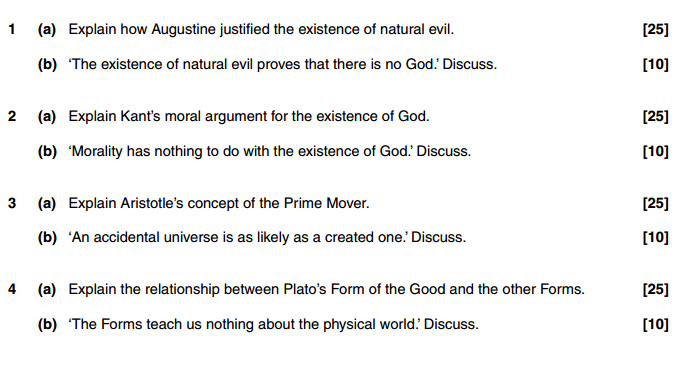
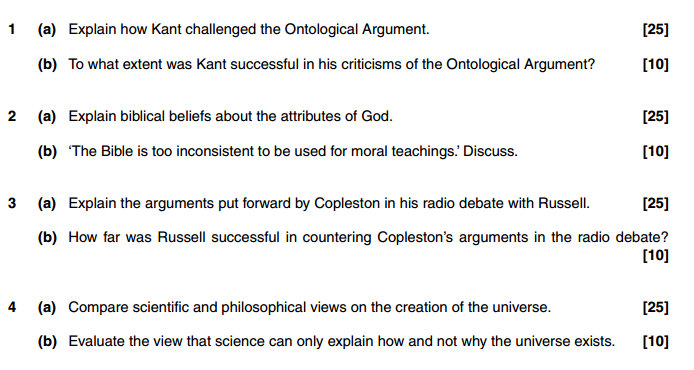
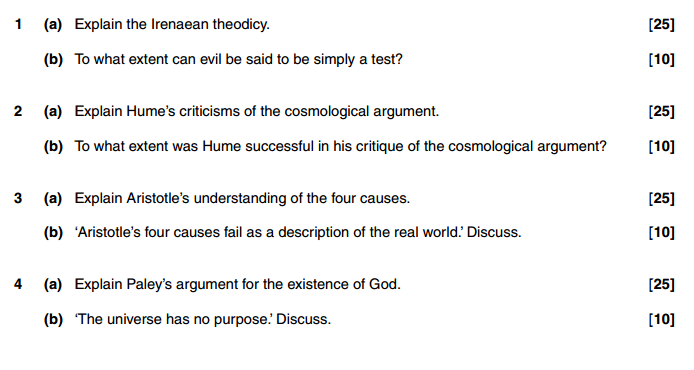
1(a) Explain what it means to say that 'God is good'. [25]
(b) 'To what extent are things only good because God commands them? [10]
2(a) Explain why some creationists do not believe in the Big Bang theory. [25]
(b) ‘Scientists are the only ones who can explain why the universe is here.’ Discuss. [10]
3(a) Explain the nature of the problem of evil. [25]
(b) 'Moral evil may be the fault of humanity but natural evil is God's fault.' Discuss. [10]
4(a) Explain what Kant means by 'Summum Bonum'. [25]
(b) 'The existence of morality is not evidence for the existence of God.' Discuss. [10]
AS
June 2010
1(a) Compare the concept of a Prime Mover with the idea of God as a craftsman. [25]
(b) 'Only Philosophers can explain creation.' Discuss. [10]
2(a) Explain Anselm's Ontological argument. [25]
(b) ‘It is pointless to deny the logical necessity of the existence of God.’ Discuss. [10]
3(a) Explain the concept of Irreducible Complexity. [25]
(b) ‘There is no evidence of Intelligent Design in the universe.' Discuss. [10]
4(a) Explain Freud's view that moral awareness comes from sources other than God. [25]
(b) 'God is the only explanation of moral awareness.' Discuss [10]
AS
January 2010
1(a) Explain the concept of ‘creatio ex nihilo’. [25]
(b) ‘Nothing comes from nothing.’ Discuss. [10]
2(a) Explain Darwinism and evolutionary theory. [25]
(b) ‘The universe is too complex for evolutionary theory to explain it.’ Discuss. [10]
3(a) Explain the concept of ‘Ideals’ in Plato’s writings. [25]
(b) ‘Ideals are an illusion; we can only experience what is real.’ Discuss. [10]
4(a) Explain Mill’s challenge to the Teleological argument. [25]
(b) Evaluate the claim that the universe has too many flaws for it to be designed. [10]
1 (a) Explain Aquinas’ Cosmological Argument. [25]
(b) To what extent were Russell’s criticisms of the Cosmological Argument successful? [10]
2 (a) Explain Kant’s moral argument for the existence of God. [25]
(b) ‘Moral awareness has nothing to do with a god.’ Discuss. [10]
3 (a) Explain the Analogy of the Cave in Plato’s Republic. [25]
(b) ‘The Analogy of the Cave tells us nothing about reality.’ Discuss. [10]
4 (a) Explain the debate between Creationism and the Big Bang theory. [25]
(b) ‘The Big Bang theory is no more believable than Creationism.’ Discuss. [10]
1 (a) Explain what Aristotle meant by final cause [25]
(b) To what extent does the concept of a final cause teach us anything about the real world? [10]
2 (a) Explain the Judaeo-Christian concept of God as law-giver and judge [25]
(b) 'God has no right to judge human beings.' Discuss [10]
3 (a) Explain the theodicy of Irenaeus. [25]
(b) 'The theodicy of Irenaeus cannot justify the existence of evil.' Discuss. [10]
4 (a) Explain how religious believrs respond to challenges posed to them by scientists. [25]
(b) 'Religious believers understand the world better than scientists.' Discuss. [10]
A2







1. To what extent can God reveal himself through sacred writings? [35]
2. Critically compare the use of myth and analogy to express human understanding of God. [35]
3. 'Resurrection is more likely to be true than reincarnation.' Discuss. [35]
4. Evaluate Hume's claim that miracles are the least likely of events. [35]
1 Evaluate the claim that analogy can successfully be used to express the human understanding of God. [35]
2 'Boethius was successful in his argument that God rewards and punishes justly.' Discuss. [35]
3 Critically assess, with reference to William James, the arguments from religious experience. [35]
4 To what extent is belief in an afterlife necessary in resolving problems raised by the existence of evil? [35]
1 Critically assess the philosophical problems raised by the belief that God is omniscient. [35]
2 'A belief in miracles leads to the concept of a God who favours some but not all of His creation.' Discuss. [35]
3 Evaluate the claim that there can be no disembodied existence after death. [35]
4 Critically asses the views of Paul Tillich on religious language. [35]
Archive:
Either
1 (a) Explain Aristotle’s theory of the Four Causes. [33]
(b) ‘Aristotle’s theory of the Four Causes is convincing.’ Discuss. [17]
Or
2 (a) Explain what is meant in the Bible by the phrase ‘God is good’. [33]
(b) ‘It is difficult to believe in a God who is perfectly good.’ Discuss. [17]
Either
1 (a) Explain Plato’s concept of the soul and its relationship to the body. [33]
(b) Compare Plato’s view of the soul with that of Aristotle. [17]
Or
2 (a) Explain what is meant in the Bible by describing God as a miracle worker. [33]
(b) ‘The presence of miracles in the Bible suggests that God is unreliable.’ Discuss. [17]
Either
1 (a) Explain Plato’s concept of ‘Forms’. [33]
(b) ‘Plato’s concept of Forms is of little use in understanding the physical world.’ Discuss. [17]
Or
2 (a) Describe Aristotle’s teaching about the differences between the Final Cause and other sorts
of cause. [33]
(b) Discuss the strengths and weaknesses of Aristotle’s ideas about cause. [17]
Either
1 (a) How do the writers of the Bible attempt to explain the creation of the world? [33]
(b) ‘God created humanity for a purpose.’ Discuss. [17]
Or
2 (a) Explain Plato’s analogy of the cave. [33]
(b) Discuss Plato’s idea that most human beings can never really know the whole truth. [17]
Either
1 (a) Explain what the writers of the Bible meant when they described God as ‘good’. [33]
(b) ‘A good God would not punish people.’ Discuss. [17]
Or
2 (a) Describe and explain some events in the Bible which are regarded as miracles. [33]
(b) ‘It is difficult to accept that miracles can happen.’ Discuss. [17]
Either
1 (a) Explain the importance of the shadows in Plato’s analogy of the cave. [33]
(b) On what grounds might Plato’s understanding of human reason be criticised?
[17]
Or
2 (a) Explain Aristotle’s understanding of the soul. [33]
(b) Compare Aristotle’s understanding of the soul with that of Plato. [17]
Part 1
Answer one question from this part.
1 (a) Explain why Hume and Russell reject the cosmological argument. [33]
(b) ‘God is the most likely explanation for the existence of the universe.’ Discuss. [17]
2 (a) Explain how Augustine accounts for the existence of evil. [33]
(b) ‘There is no problem of evil because evil does not exist.’ Discuss. [17]
3 (a) Explain Kant’s moral argument for the existence of God. [33]
(b) ‘Morality comes from people, not from God.’ Discuss. [17]
Part 2
Answer one question from this part.
4 (a) Explain Anselm’s ontological argument. [33]
(b) ‘God’s existence can never be proved by logic.’ Discuss. [17]
5 (a) Explain William James’ argument for the existence of God from religious experience. [33]
(b) ‘Religious experiences comes from fantasy, not God.’ Discuss. [17]
6 (a) Explain how sociologists account for the existence of religious belief. [33]
(b) ‘God is nothing more than society’s idea of itself.’ Discuss. [17]
Part 1
Answer one question from this part.
1 (a) Explain Aquinas ’ cosmological argument. [33]
(b) ‘No convincing explanation for the existence of the universe has yet been found.’ Discuss. [17]
2 (a) Explain how Irenaeus accounts for the existence of evil. [33]
(b) ‘God is the cause of all evil.’ Discuss. [17]
3 (a) Explain Kant’s reasons for arguing that human morality points to the existence of God. [33]
(b) ‘Freud’s objections destroy Kant’s moral argument for the existence of God.’ Discuss. [17]
Part 2
Answer one question from this part.
4 (a) Explain Descartes ’ ontological argument. [33]
(b) ‘The ontological argument will only convince those who already believe in God.’ Discuss. [17]
5 (a) Explain Hume’s objections to teleological arguments. [33]
(b) ‘God is the most likely explanation for design in the universe.’ Discuss. [17]
6 (a) Explain how psychology accounts for the existence of religious belief. [33]
(b) ‘God is an invention of the mind.’ Discuss. [17]
Part 1
Answer one question from this part.
1 (a) Explain Freud’s objections to the argument from religious experience. [33]
(b) ‘The best explanation of religious experience is that it comes from God.’ Discuss. [17]
2 (a) Explain Descartes ’ version of the ontological argument. [33]
(b) ‘The ontological argument is weak.’ Discuss. [17]
3 (a) Explain Aquinas’ fi rst three ‘Ways’ of proving the existence of God. [33]
(b) ‘The universe obviously exists, so God must have created it.’ Discuss. [17]
Part 2
Answer one question from this part.
4 (a) Explain Aquinas’ teleological argument and Darwinist objections to it. [33]
(b) ‘Arguments from design must fail because they do not prove the existence of a God who is
all-powerful.’ Discuss. [17]
5 (a) Explain how Irenaeus accounts for the existence of both moral and natural evil. [33]
(b) ‘The greatest strength of Irenaeus’ explanation of evil is that it points to a loving God.’
Discuss. [17]
6 (a) Describe sociological explanations of belief in God. [33]
(b) ‘Sociology cannot explain God.’ Discuss. [17]
Part 1
Answer one question from this part.
1 (a) Explain how teleological arguments attempt to prove the existence of God. [33]
(b) ‘Mill proved that teleological arguments cannot prove the existence of God.’ Discuss. [17]
2 (a) Explain how Kant’s understanding of morality leads him to assume the existence of God. [33]
(b) ‘Kant’s assumption that God exists is wrong.’ Discuss. [17]
3 (a) Explain William James’ argument that the nature of religious experience proves the existence of God. [33]
(b) ‘Religious experiences are nothing more than a product of the human mind.’ Discuss. [17]
Part 2
Answer one question from this part.
4 (a) Explain why Anselm’s ontological argument concludes that God has to exist. [33]
(b) ‘Anselm’s ontological argument is wrong.’ Discuss. [17]
5 (a) Explain how Irenaeus and Augustine account for the existence of moral evil. [33]
(b) ‘The suff erings of innocent people destroy any attempt to explain why God allows moral evil.’Discuss. [17]
6 (a) Explain psychological objections to religious belief. [33]
(b) ‘Psychological objections to religious belief are nonsense.’ Discuss. [17]
Part 1
Answer one question from this part.
1 (a) Explain the challenges of Gaunilo and Kant to the ontological argument. [33]
(b) ‘The ontological argument is a convincing argument.’ Discuss. [17]
2 (a) Explain Durkheim’s and Weber’s understanding of the nature and role of religion in society.
[33]
(b) ‘Religion is only relevant if it has a role in society.’ Discuss. [17]
3 (a) Explain Hume’s challenge to Aquinas’ cosmological argument. [33]
(b) ‘The cosmological argument cannot prove God exists.’ Discuss. [17]
Part 2
Answer one question from this part.
4 (a) Explain Paley’s version of the teleological argument and Mill’s objections to it. [33]
(b) ‘Evolution leaves no room for a designer of the universe.’ Discuss. [17]
5 (a) Explain Freud’s challenge to Kant’s moral argument for the existence of God. [33]
(b) ‘Our sense of moral duty is learnt from our parents, and not from God.’ Discuss. [17]
6 (a) Explain Augustine’s response to the existence of natural evil. [33]
(b) ‘There is no problem of evil because God does not exist.’ Discuss. [17]
Part 1
Answer one question from this part.
1 (a) Explain Copleston’s version of the cosmological argument. [33]
(b) ‘Copleston’s argument does not prove that God exists.’ Discuss. [17]
2 (a) Explain how Paley uses observations of a purposeful and ordered universe to prove the existence of God. [33]
(b) ‘Paley’s arguments are weaker than the criticisms of them.’ Discuss. [17]
3 (a) Explain how Augustine understands the role of human free will. [33]
(b) ‘The world was made perfect so God cannot be responsible for the existence of evil.’ Discuss. [17]
Part 2
Answer one question from this part.
4 (a) Explain Freud’s conclusions about the nature of religious belief. [33]
(b) ‘Psychological explanations present no real threat to belief in God.’ Discuss. [17]
5 (a) Explain how Descartes’ ontological argument claims that if you understand what God is then
you must accept that God exists. [33]
(b) To what extent is Kant’s view that ‘existence is not a perfection’ a valid criticism of the
ontological argument? [17]
6 (a) Explain psychological understandings of religion. [33]
(b) ‘Psychology does not present a challenge to religion.’ Discuss. [17]
June 2005
Answer two questions.
1 ‘The concept of resurrection of the body is incoherent.’ Discuss.
2 ‘By definition, a miracle can never happen.’ Discuss.
3 ‘Philosophers have proved conclusively that religious language is meaningful.’ Discuss.
4 ‘God is most clearly revealed to humanity through scripture.’ Discuss.
June 2006
Answer two questions.
1 ‘The concept of disembodied existence is coherent.’ Discuss.
2 Assess the view that the different forms of religious experience are nothing more than fantasy.
3 ‘The falsification principle offers no real challenge to religious belief.’ Discuss.
4 ‘Scripture is the word of God.’ Discuss.
June 2007
Answer two questions.
1 ‘The concept of Hell makes no sense.’ Discuss.
2 ‘The best way to God is through religious experience.’ Discuss.
3 Assess the view that miracles are an obstacle to faith.
4 Consider whether symbol provides any clear understanding of God.
Answer two questions.
1 To what extent can God be held responsible for moral evil?
2 ‘Religious language and ethical language are both about facts.’ Discuss.
3 ‘The only point in behaving morally is to be rewarded after death.’ Discuss.
Answer two questions.
1 ‘Ethics are the product of society, not of religion.’ Discuss.
2 ‘Evil exists because humans have free will.’ Discuss.
3 ‘The fact that we have a conscience proves that God exists.’ Discuss.
Answer two questions.
1 ‘Ethics come from the human mind; not from God.’ Discuss.
2 ‘Ethical language is no more meaningful than religious language.’ Discuss.
3 ‘God is omniscient so therefore we cannot have free will.’ Discuss.